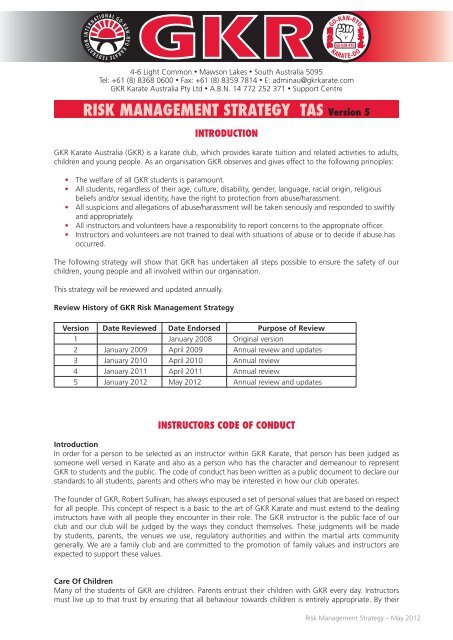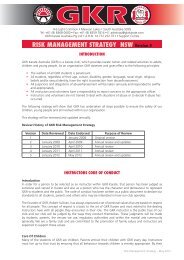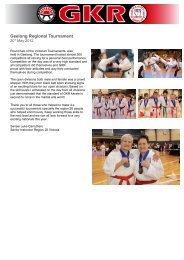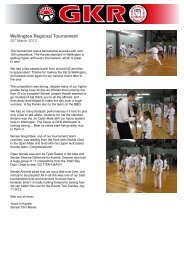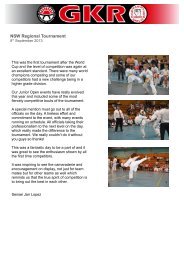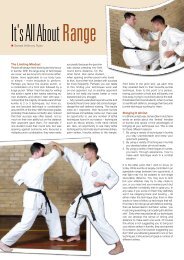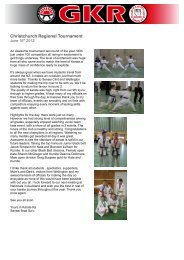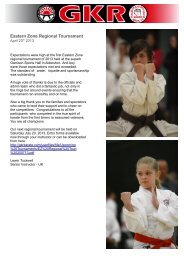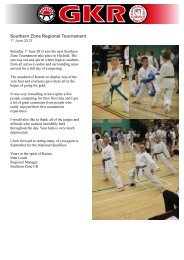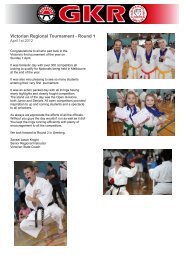Risk Management_TAS - GKR Karate
Risk Management_TAS - GKR Karate
Risk Management_TAS - GKR Karate
Create successful ePaper yourself
Turn your PDF publications into a flip-book with our unique Google optimized e-Paper software.
4-6 Light Common • Mawson Lakes • South Australia 5095<br />
Tel: +61 (8) 8368 0600 • Fax: +61 (8) 8359 7814 • E: adminau@gkrkarate.com<br />
<strong>GKR</strong> <strong>Karate</strong> Australia Pty Ltd • A.B.N. 14 772 252 371 • Support Centre<br />
RISK MANAGEMENT STRATEGY <strong>TAS</strong> Version 5<br />
Introduction<br />
<strong>GKR</strong> <strong>Karate</strong> Australia (<strong>GKR</strong>) is a karate club, which provides karate tuition and related activities to adults,<br />
children and young people. As an organisation <strong>GKR</strong> observes and gives effect to the following principles:<br />
• The welfare of all <strong>GKR</strong> students is paramount.<br />
• All students, regardless of their age, culture, disability, gender, language, racial origin, religious<br />
beliefs and/or sexual identity, have the right to protection from abuse/harassment.<br />
• All suspicions and allegations of abuse/harassment will be taken seriously and responded to swiftly<br />
and appropriately.<br />
• All instructors and volunteers have a responsibility to report concerns to the appropriate officer.<br />
• Instructors and volunteers are not trained to deal with situations of abuse or to decide if abuse has<br />
occurred.<br />
The following strategy will show that <strong>GKR</strong> has undertaken all steps possible to ensure the safety of our<br />
children, young people and all involved within our organisation.<br />
This strategy will be reviewed and updated annually.<br />
Review History of <strong>GKR</strong> <strong>Risk</strong> <strong>Management</strong> Strategy<br />
Version Date Reviewed Date Endorsed Purpose of Review<br />
1 January 2008 Original version<br />
2 January 2009 April 2009 Annual review and updates<br />
3 January 2010 April 2010 Annual review<br />
4 January 2011 April 2011 Annual review<br />
5 January 2012 May 2012 Annual review and updates<br />
Instructors Code of Conduct<br />
Introduction<br />
In order for a person to be selected as an instructor within <strong>GKR</strong> <strong>Karate</strong>, that person has been judged as<br />
someone well versed in <strong>Karate</strong> and also as a person who has the character and demeanour to represent<br />
<strong>GKR</strong> to students and the public. The code of conduct has been written as a public document to declare our<br />
standards to all students, parents and others who may be interested in how our club operates.<br />
The founder of <strong>GKR</strong>, Robert Sullivan, has always espoused a set of personal values that are based on respect<br />
for all people. This concept of respect is a basic to the art of <strong>GKR</strong> <strong>Karate</strong> and must extend to the dealing<br />
instructors have with all people they encounter in their role. The <strong>GKR</strong> instructor is the public face of our<br />
club and our club will be judged by the ways they conduct themselves. These judgments will be made<br />
by students, parents, the venues we use, regulatory authorities and within the martial arts community<br />
generally. We are a family club and are committed to the promotion of family values and instructors are<br />
expected to support these values.<br />
Care Of Children<br />
Many of the students of <strong>GKR</strong> are children. Parents entrust their children with <strong>GKR</strong> every day. Instructors<br />
must live up to that trust by ensuring that all behaviour towards children is entirely appropriate. By their<br />
<strong>Risk</strong> <strong>Management</strong> Strategy – May 2012
nature children will view their sensei as a leader and a person to be respected and in turn an instructor will<br />
have earned this respect by the way the instructor conducts himself or herself. <strong>GKR</strong> will take the appropriate<br />
steps to screen potential instructors.<br />
Honesty & Citizenship<br />
<strong>GKR</strong> will expect that all instructors will operate in an honest manner. This extends to all dealings inside and<br />
outside the organisation. Part of this is an expectation that all instructors strive to be good citizens within<br />
their personal environment.<br />
Beliefs<br />
A person is entitled to pursue their own beliefs and standards without undue disruption and interference<br />
from others. These differences may arise through religion, personal values, gender and ethnicity. Instructors<br />
will be respectful, understanding and accommodating of these matters.<br />
Sexual Harassment<br />
Any form of sexual harassment is totally unacceptable. Sexual harassment can take the form of verbal<br />
comments concerning appearance, private life or other issues. It can take the form of unwanted physical<br />
contact, adult humour, double entendre etc. <strong>GKR</strong> does not seek to encroach on the normal social interplay<br />
between people, however <strong>GKR</strong> is all about respect for your fellow participants, and any form of sexual<br />
harassment runs completely counter to this and will not be tolerated.<br />
Equal Opportunity<br />
<strong>GKR</strong> has an overriding policy of equal opportunity for students to train in and enjoy <strong>Karate</strong>. This country<br />
has laws that are designed to promote equal opportunity. <strong>GKR</strong> will not tolerate discrimination against any<br />
person on the basis of gender, sexual orientation, ethnicity, age, physical or mental handicap. At the same<br />
time instructors will be mindful of medical conditions that may affect the safety and well being of other<br />
students. Any concerns of this nature are to be dealt with sensitively and reported to the senior instructor at<br />
the earliest opportunity. Instructors will always be sensitive to the varying needs of its students. <strong>GKR</strong> prides<br />
itself on being a welcoming organisation for all people, and instructors are its ambassadors.<br />
Policy Objectives<br />
The policy objectives of this <strong>Risk</strong> <strong>Management</strong> Strategy are to promote good practice:<br />
• Affirm that in all circumstances, all students have the right to feel and be safe from exploitation<br />
and abuse.<br />
• Provide children and young people with appropriate safety and protection whilst in the care of<br />
<strong>GKR</strong>’s instructors and volunteers.<br />
• Allow all instructors and volunteers to make informed and confident responses to specific child<br />
protection issues.<br />
• Ensure that <strong>GKR</strong> has procedures in place that will protect the children with whom they come into<br />
contact with.<br />
• Clearly express the actions <strong>GKR</strong> will take in the case of any breach of this strategy.<br />
child protection Policy Statement<br />
<strong>GKR</strong> has a duty of care to safeguard all children involved in <strong>GKR</strong> from harm. All children have a right to<br />
protection, and the needs of the disabled children and others who may be vulnerable must be taken into<br />
account. <strong>GKR</strong> will ensure the safety and protection of all children involved in <strong>GKR</strong> through adherence to the<br />
<strong>Risk</strong> <strong>Management</strong> Strategy adopted by <strong>GKR</strong>.<br />
A child is defined as a person under the age of 18.<br />
<strong>Risk</strong> <strong>Management</strong> Strategy – May 2012
Promoting Good Practice<br />
Child abuse, particularly sexual abuse, can arouse strong emotions in those facing such a situation. It is<br />
important to understand these feelings and not allow them to interfere with your judgement about the<br />
appropriate action to take.<br />
Abuse can occur within many situations including the home, school and the sporting environment. Some<br />
individuals will actively seek employment or voluntary work with young people in order to harm them.<br />
A coach, instructor, teacher, official or volunteer will have regular contact with young people and be<br />
an important link in identifying cases where they need protection. All suspicious cases of poor practice<br />
should be reported to <strong>GKR</strong>’s Child Protection Officer who can be contacted via the <strong>GKR</strong> Australian office<br />
at 4-6 Light Common, Mawson Lakes SA 5095, telephone (08) 8368 0600 or alternatively via email<br />
childsafe@gkrkarate.com following the guidelines in this document.<br />
When a child enters the club having been subjected to child abuse outside the sporting environment, karate<br />
can play a crucial role in improving the child’s self-esteem. In such instances the club must work with the<br />
appropriate agencies to ensure the child receives the required support.<br />
Good Practice Guidelines<br />
All personnel should be encouraged to demonstrate exemplary behaviour in order to protect<br />
themselves from false allegations. The following are common sense examples of how to create<br />
a positive culture and climate.<br />
Good Practice Means<br />
• Always working in an open environment avoiding private or unobserved situations and encouraging<br />
open communication.<br />
• Treating all young people/disabled adults equally with respect and dignity.<br />
• Always putting the welfare of each young person first.<br />
• Maintaining a safe and appropriate distance with students (eg; it is not appropriate for instructors<br />
or volunteers to have an intimate relationship with a child or to share a room with them).<br />
• Building balanced relationships based on mutual trust and empowering children to share in decision<br />
making.<br />
• Making karate fun, enjoyable and promoting fair play.<br />
• Ensuring that if any form of manual/physical support is required, it should be provided openly and<br />
according to guidelines provided by the Sempai Training Program. Young people should always be<br />
consulted and their agreement gained. Some parents are becoming increasingly sensitive about<br />
manual support and their views should always be carefully considered.<br />
• Keeping up to date with technical skills, qualifications and insurance.<br />
• Involving parents wherever possible. If groups have to be supervised in changing rooms, always<br />
ensure parents, instructors, volunteers or officials work in pairs.<br />
• Ensuring that if mixed teams are taken away for the day or night, a male and female volunteer<br />
should always accompany them. However, remember that same gender abuse can also occur.<br />
• Ensuring that at tournaments or residential events, adults should not enter children’s rooms or<br />
invite children into their rooms.<br />
• Being an excellent role model – this includes not smoking, drinking alcohol, taking illicit drugs or<br />
using offensive language in the company of young people.<br />
• Giving enthusiastic and constructive feedback rather than negative criticism.<br />
• Recognising the developmental needs and capacity of young people and disabled adults – avoiding<br />
excessive training or competition and not pushing them against their will.<br />
• Keeping a written record of any injury that occurs, along with the details of any treatment given.<br />
Practices To Be Avoided<br />
The following should be avoided except in emergencies. If a case arises where these situations are unavoidable<br />
(eg the child sustains an injury and needs to go to hospital, or a parent fails to arrive to pick a child up at<br />
the end of a session), it should be with the full knowledge and consent of someone in charge in the club<br />
or the child’s parents.<br />
<strong>Risk</strong> <strong>Management</strong> Strategy – May 2012
Avoid<br />
• Spending excessive amounts of time alone with children away from others.<br />
• Taking or dropping off a child to an event or activity.<br />
• Holding a training session with only one child present and no other adults.<br />
Practices Never To Be Sanctioned<br />
The following should never be sanctioned. You should never:<br />
• Engage in rough physical or sexually provocative games, including horseplay.<br />
• Share a room with a child.<br />
• Allow or engage in any form of inappropriate touching.<br />
• Allow children to use inappropriate language unchallenged.<br />
• Make sexually suggestive comments to a child, even in fun.<br />
• Reduce a child to tears as a form of control.<br />
• Allow allegations made by a child to go unchallenged, unrecorded or not acted upon.<br />
• Do things of a personal nature for children or disabled adults that they can do for themselves.<br />
• Invite or allow children to stay with you at your home unsupervised.<br />
NB: It may sometimes be necessary for instructors or volunteers to do things of a personal nature for children,<br />
particularly if they are young or disabled. These tasks should only be carried out with the full understanding<br />
and consent of the parents and students involved. There is a need to be responsive to a person’s reactions.<br />
If a person is fully dependant on you, talk with him/her about what you are doing and give choices where<br />
possible. This is particularly so if you are involved in any dressing or undressing of outer clothing, or where<br />
the physical contact, lifting or assisting a child to carry out particular activities. Avoid taking on responsibility<br />
for tasks which you are not appropriately trained.<br />
Incidents That Must Be Reported/Recorded<br />
If any of the following occur you should report this immediately to another colleague and record<br />
the incident. You should also ensure the parents of the child are informed:<br />
• If you accidentally hurt a student.<br />
• If he/she seems distressed in any manner<br />
• If a student appears to be sexually aroused by your actions.<br />
• If a student misunderstands or misinterprets something you have done.<br />
Responding to allegations or suspicions<br />
It is not the responsibility of anyone working in <strong>GKR</strong> in a paid or unpaid capacity, to decide whether or not<br />
child abuse has taken place. However, there is a responsibility to act on any concerns through contact with<br />
the relevant authorities.<br />
<strong>GKR</strong> assures all instructors and volunteers that it will fully support and protect anyone who in good<br />
faith reports his/her concern that a colleague is, or may be, abusing a child. There may be three types of<br />
investigation, where there is a complaint against an instructor or volunteer.<br />
• A criminal investigation<br />
• A child protection investigation<br />
• A disciplinary or misconduct investigation<br />
The results of a police and child protection investigation may influence the disciplinary investigation, but<br />
not necessarily.<br />
Action If There Are Concerns<br />
Concerns about suspected abuse<br />
• If there is imminent danger to a child the Police should be called.<br />
• Any suspicion that a child has been abused by an instructor, volunteer or other persons should be<br />
reported to <strong>GKR</strong>’s Accreditation/Child Protection Officer, who will take such steps as considered<br />
necessary to ensure the safety of the child in question and any other child who may be at risk.<br />
<strong>Risk</strong> <strong>Management</strong> Strategy – May 2012
• The Accreditation/Child Protection Officer will refer the allegation to the relevant authorities or go<br />
directly to the police if out of hours.<br />
• The parents or carers of the child will be contacted as soon as possible following advice from the<br />
relevant authorities.<br />
• Relevant information and actions taken are fully recorded and securely stored.<br />
Confidentiality<br />
Every effort should be made to ensure that confidentiality is maintained for all concerned. Information<br />
should be handled and disseminated on a need to know basis only.<br />
This includes the following people:<br />
• The Accreditation/Child Protection Officer<br />
• The parents or the person who is alleged to have been abused.<br />
• The person making the allegation.<br />
Seek advice from the relevant authorities on who should approach the alleged abuser (or parents if the<br />
alleged abuser is a child). Information should be stored in a secure place with limited access to designated<br />
people, in line with data protection laws (eg that information is accurate, regularly updated, relevant and<br />
secure).<br />
Internal Enquiries And Suspension<br />
• The <strong>GKR</strong> Accreditation/Child Protection Officer will make an immediate decision about whether any<br />
individual accused of abuse should be temporarily suspended pending further police and inquiries by<br />
the relevant authorities.<br />
• Irrespective of the findings of the relevant authorities or police inquiries <strong>GKR</strong> will assess all individual<br />
cases to decide whether an instructor or volunteer can be reinstated and how this can be sensitively<br />
handled. This may be a difficult decision, particularly where there is insufficient evidence to uphold any<br />
action by the police. In such cases, <strong>GKR</strong> must reach a decision based upon the available information,<br />
which could suggest that on a balance of probability; it is more likely than not that the allegation is<br />
true. The welfare of the child should remain of paramount importance throughout.<br />
Support To Deal With The Aftermath Of Abuse<br />
• Consideration should be given to the kind of support that children, parents, instructors and volunteers<br />
may need. Use of help lines, support groups and open meetings will maintain an open culture and<br />
help the healing process.<br />
• Consideration should be given to what kind of support may be appropriate for the alleged<br />
perpetrator.<br />
Information For The Relevant Authorities Or The Police About Suspected Abuse<br />
To ensure that this information is as helpful as possible, a detailed record should always be made at the time<br />
of the disclosure/concern, which should include the following.<br />
• The child’s name, age and date of birth.<br />
• The child’s home address and telephone number.<br />
• Whether or not the person making the report is expressing their own concerns or those of<br />
someone else.<br />
• The nature of the allegation. Include dates, times, any special factors and other relevant<br />
information.<br />
• Make a clear distinction between what is fact, opinion or hearsay.<br />
• A description of any visible bruising or other injuries. Also any indirect signs, such as behavioural<br />
changes.<br />
• Details of witnesses to the incidents.<br />
• The child’s account, if it can be given, of what has happened and how any bruising or other injuries<br />
occurred.<br />
• Have the parents been contacted?<br />
• If so, what has been said?<br />
• Has anyone else been consulted? If so, record details.<br />
• If the child was not the person who reported the incident, has the child been spoken to? If so,<br />
what was said?<br />
<strong>Risk</strong> <strong>Management</strong> Strategy – May 2012
• Has anyone been alleged to be the abuser? Record details.<br />
• Where possible referral to the police or relevant authorities should be confirmed in writing within<br />
24 hours and the name of the contact that took the referral should be recorded.<br />
Bullying/HARASSMENT<br />
Bullying/harassment is regarded as the repeated oppression, psychological and/or physical, of a less powerful<br />
person by another person or group of persons. <strong>GKR</strong> considers bullying as an inappropriate behaviour and<br />
will take all allegations seriously.<br />
Action If Bullying/Harassment Is Suspected<br />
If bullying or harassment is suspected, the same procedure should be followed as set out in “Responding<br />
to suspicions or allegations”.<br />
Action to help the victim and prevent bullying in karate.<br />
• Take all signs of bullying very seriously.<br />
• Encourage all children to speak and share their concerns. Help the victim to speak out and tell the<br />
person in charge or someone in authority.<br />
• Investigate all allegations and take action to ensure the victim is safe. Speak with the victim and the<br />
bully or bullies separately.<br />
• Reassure the victim that you can be trusted and will help them, although you cannot promise to tell<br />
no one else.<br />
• Keep records of what is said (what happened, by whom & when).<br />
• Report any concerns to the Accreditation/Child Protection Officer or the school (wherever the<br />
bullying is occurring).<br />
Action toward the bully/bullies.<br />
• Talk with the bully/bullies, explain the situation, and try to get the bully/bullies to understand the<br />
consequences of their behaviour. Seek an apology to the victim(s).<br />
• Inform the bully/bullies parents.<br />
• Insist on the return of “borrowed” items and that the bully/bullies compensate the victim.<br />
• Provide support for the victim’s coach.<br />
• Impose sanctions as necessary.<br />
• Encourage and support the bully/bullies to change behaviour.<br />
• Hold meetings with the families to report on progress.<br />
• Keep a written record of action taken.<br />
If you suspect a child is in immediate danger, the Police should be called.<br />
Recruitment and Training – Instructor Accreditation Program<br />
Recruitment And Training Of Instructors And Volunteers<br />
<strong>GKR</strong> recognises that anyone may have the potential to abuse children in some way and that all reasonable<br />
steps are taken to ensure unsuitable people are prevented from working with children.<br />
Training<br />
The Instructor Training Program includes a comprehensive good practice and child protection awareness<br />
content designed to ensure the observance and maintenance of the <strong>GKR</strong> <strong>Risk</strong> <strong>Management</strong> Strategy.<br />
A pre condition of completion of the Instructor Training Program will be an acceptance by the trainee that<br />
they fully accept and understand the <strong>Risk</strong> <strong>Management</strong> Strategy and Code of Conduct which forms part of<br />
the Instructor Agreement.<br />
Instructor Training Program<br />
• Entry to the Instructor Training Program is by invitation and incorporates the Instructor<br />
Accreditation Program.<br />
<strong>Risk</strong> <strong>Management</strong> Strategy – May 2012
The Instructor Accreditation Program includes:<br />
• Assessment of qualifications including teaching and technical abilities.<br />
• Acknowledgment of a current Police Check, which must be updated every three years.<br />
• Completion of Basic Life Support First Aid Course or higher qualification, which must be regularly<br />
updated.<br />
• Completion of the Instructor Agreement, which requires Instructors to adopt and abide by the <strong>GKR</strong><br />
Code of Conduct, <strong>Risk</strong> <strong>Management</strong> Strategy and Privacy Policy.<br />
• An understanding of <strong>GKR</strong>’s Incident <strong>Management</strong> Program for reporting an injury.<br />
Once accredited the Instructor receives:<br />
• An identifying badge<br />
• Certificate of Accreditation<br />
• First Aid Kit<br />
• Instructor Manual (digital copy)<br />
• Kids games catalogue (digital copy)<br />
• Instructor Manual DVD<br />
• Grading Syllabus (digital copy)<br />
• Essential Guide to <strong>GKR</strong>’s <strong>Risk</strong> <strong>Management</strong> Strategy (digital copy)<br />
Recording Of Instructor Information<br />
Records for each Instructor are kept, in a safe and secure environment at <strong>GKR</strong> <strong>Karate</strong> Australia, 4-6 Light<br />
Common, Mawson Lakes, South Australia 5095.<br />
Each record consists of:<br />
• Personal details (Full name, Date of birth, Address, Contact telephone numbers and email address)<br />
• Assessment details of teaching and technical abilities.<br />
• Signed Instructor Agreement.<br />
• Copy of a current Police Check.<br />
• Copy of a current First Aid Certificate.<br />
The above information is entered into a specifically designed Microsoft Access Database. This database is<br />
maintained and updated to reflect any new information as it is obtained.<br />
Maintenance Of Records<br />
Police Records<br />
While <strong>GKR</strong> recognises there is no legal requirement for Police Checking of instructors whom will be working<br />
with children or vulnerable people in Tasmania, we have elected to conduct these checks every three years<br />
to ensure the safety of all involved with <strong>GKR</strong>.<br />
On receipt of a completed Police Check with either no or minor traffic convictions, the Accreditation/Child<br />
Protection Officer updates the instructor’s file and the accreditation process continues.<br />
A completed Police Check with any other convictions is followed up with the Regional Manager and<br />
instructor, before a decision is made regarding engaging the instructor’s services.<br />
First Aid<br />
A report is generated from the Database every month that indicates instructors required to update their<br />
first aid qualifications. The report is passed onto the Regional Manager, who organises for the instructor<br />
to attend a relevant First Aid Course. On receipt of an updated First Aid Certificate the Accreditation/Child<br />
Protection Officer, updates the database and files a copy of the certificate with the instructor’s paper record.<br />
The original certificate is forwarded to the instructor via the Regional Manager.<br />
First Aid Kits<br />
Each instructor is issued with a first aid kit upon Accreditation. The instructor is required to check their first<br />
aid kits every six months for used or out of date products. All out of date products are to be removed and<br />
disposed of appropriately. Any replacement products are reordered via the Regional Manager and the kit is<br />
restocked.<br />
<strong>Risk</strong> <strong>Management</strong> Strategy – May 2012
Ongoing Support and Training<br />
All instructors are required to attend Senior Training each week, which is facilitated by the local Regional<br />
Manager.<br />
These training sessions provide instructors weekly contact with <strong>GKR</strong>’s local representative and classes allow<br />
for:<br />
• Continued improvement in <strong>Karate</strong> skills.<br />
• Continued education in improving Teaching skills.<br />
• Reinforcement of Instructor responsibilities to adhere to <strong>GKR</strong>’s <strong>Risk</strong> <strong>Management</strong> Strategy and<br />
Code of Conduct.<br />
• An opportunity for instructors to be informed of new initiatives or policies implemented by <strong>GKR</strong>.<br />
• An opportunity for instructors to raise areas of concern.<br />
• An opportunity to discuss issues in a peer supported environment.<br />
Instructor Responsibilities And Main Duties<br />
To become an accredited <strong>GKR</strong> <strong>Karate</strong> instructor is an honour and a privilege. This privilege carries important<br />
responsibilities and duties.<br />
These duties and responsibilities are clearly set out in the Instructor Manual which is provided to every<br />
instructor upon Accreditation.<br />
Each instructor is encouraged to contact their Regional Manager immediately, if he/she has any urgent<br />
concerns.<br />
Code of Conduct for students<br />
• Students should feel safe with other participants, club officials and your instructors.<br />
• Students must be treated in a non-discriminatory way and to receive a fair go.<br />
• Students should respect the rights, dignity and worth of all officials and participants regardless of<br />
ability, gender or cultural background.<br />
• Students should display control and courtesy to all involved.<br />
• Students should ensure that your decisions and actions contribute to a safe and harassment-free<br />
environment.<br />
Code of Conduct for parents and spectators<br />
• Have a responsibility to respect the rights, dignity, efforts and worth of all officials and participants<br />
regardless of ability, gender or cultural background.<br />
• Have a responsibility to encourage all children to participate and compete according to the rules.<br />
• Have a responsibility to adopt appropriate behaviours in all interactions.<br />
• Cameras and video are to be for private use only. No images of young people are to be published<br />
to the website or print without parental consent.<br />
Smoke Free Policy<br />
<strong>GKR</strong> recognises that exposure to tobacco smoke either directly or passively is hazardous to health.<br />
Accordingly, the following policy shall apply to all club facilities, functions, meetings and activities undertaken<br />
by the club and will apply to all members, officials and club visitors.<br />
Facilities<br />
All dojos, halls and event venues are to be completely smoke free.<br />
<strong>Risk</strong> <strong>Management</strong> Strategy – May 2012
Participants And Officials<br />
Sensei’s, Sempai’s, students, volunteers and officials will refrain from smoking while involved in an official<br />
capacity for <strong>GKR</strong>.<br />
<strong>GKR</strong> recognises the importance of educating club members of the benefits of implementing a smoke free<br />
policy and will endeavour to provide information to assist this process. Further information can be obtained<br />
from www.quitnow.info.au<br />
PROTECTIVE EQUIPMENT<br />
<strong>Karate</strong> is a physical activity and as with all physical activity there is a small risk of injury. Through our intensive<br />
Instructor Training Program <strong>GKR</strong> instructors are taught ways to minimise this risk at all classes, including the<br />
use of protective equipment where applicable.<br />
Blood Rule Guidelines<br />
<strong>GKR</strong> recognises that there is a small risk of Blood-Borne Pathogens causing harm to members. Therefore, to<br />
minimise this risk, the following guidelines must be adhered to.<br />
• Any participant found to be bleeding must cease training/competing until such time as the bleeding<br />
has stopped and the affected area is completely and securely covered.<br />
• Upon acknowledgement of any protective equipment with blood on it, the item must be changed,<br />
where contact with another participant is likely.<br />
• Cleaning of any blood spill should only be undertaken whilst wearing gloves.<br />
Special events/tournaments<br />
All of the <strong>Risk</strong> <strong>Management</strong> Strategy and its policies are adhered to when an event/tournament is held by<br />
<strong>GKR</strong>, with the addition of the following items.<br />
An event co-ordinator is appointed for each special event/tournament held by <strong>GKR</strong>. This person is responsible<br />
for ensuring the safety of all participants, officials, volunteers and spectators.<br />
Venue<br />
The co-ordinator is responsible for ensuring that the venue is safe and that there are no potential hazards<br />
and that none arise whilst the event is in progress.<br />
Protective Equipment<br />
The co-ordinator is responsible for ensuring that officials are aware of procedures re the wearing of protective<br />
equipment at the event.<br />
Officials<br />
The co-ordinator is responsible for ensuring that all officials and volunteers are aware of <strong>GKR</strong>’s Code of<br />
Conduct and that they hold any state relevant Working with Children Checks. The coordinator is the officials/<br />
volunteers go to person should any issues arise.<br />
Behaviour Of Participants And Spectators<br />
The co-ordinator is responsible for ensuring that a copy of the Code of Conduct for students and spectators<br />
is on display at the venue. The co-ordinator will address any inappropriate behaviours by students or<br />
spectators, should the need arise.<br />
First Aid<br />
The co-ordinator is responsible for ensuring that qualified First Aid Officers are present at the event and<br />
that appropriate First Aid equipment is available. The co-ordinator will also ensure that emergency contact<br />
details are available at the event for every participant.<br />
<strong>Risk</strong> <strong>Management</strong> Strategy – May 2012
<strong>GKR</strong> <strong>Karate</strong> – Social Media Policy<br />
Introduction<br />
Social media offers the opportunity for people to gather in online communities of shared interest and<br />
create, share or consume content.<br />
Globally the interest and participation in social media is growing at phenomenal rates. This interest also<br />
extends to <strong>GKR</strong> who recognises that social media offers new opportunities to engage in conversations with<br />
students and other communities with shared interests.<br />
<strong>GKR</strong> embraces social media as an important tool of business engagement. <strong>GKR</strong> also encourages its<br />
contractors to use social media in a personal capacity as a way to reach out and share information and<br />
views with friends and communities – both old and new.<br />
With the rapid growth and application of social media, <strong>GKR</strong> recognises the need to have a policy which<br />
ensures that contractors who use social media as part of their job, or in a personal capacity, have guidance<br />
as to the expectations where the social media engagement is about <strong>GKR</strong>, its products and services, its<br />
people, its competitors and/or other business related individuals or organisations. <strong>GKR</strong>’s 3 Rs of Social Media<br />
Engagement are therefore ‘guardrails’ designed to protect the interests of contractors and the company. In<br />
brief, the 3 Rs ask that when engaging in social media you be clear about who you are representing, you<br />
take responsibility for ensuring that any references to <strong>GKR</strong> are factually correct and accurate and do not<br />
breach confidentiality requirements, and that you show respect for the individuals and communities with<br />
which you interact.<br />
It is important to note that this policy does not apply to contractors personal use of social media platforms<br />
where the contractor makes no reference to <strong>GKR</strong> related issues.<br />
Given the rapid development and uptake of social media and its growing relevance to business activity, this<br />
policy will be reviewed regularly to ensure it remains relevant and applicable.<br />
Application<br />
This section outlines how <strong>GKR</strong>’s 3 Rs of Social Media Engagement are applied if you choose to make<br />
references to <strong>GKR</strong>, its people, products or services, its competitors, and/or other business related individuals<br />
or organisations when you are using a social media platform.<br />
<strong>GKR</strong>’s 3 Rs of Social Media Engagement is a Company Policy of <strong>GKR</strong> <strong>Karate</strong> International and it applies to all<br />
<strong>GKR</strong> contractors and to any other person who is notified that this Company Policy applies to them.<br />
If you require clarification about aspects of this policy and how it applies to your own circumstances, please<br />
contact your Zone Director who can provide guidance.<br />
Policy<br />
<strong>GKR</strong>’s 3 Rs Of Social Media Engagement Are Representation, Responsibility And Respect<br />
Representation<br />
You are required to:<br />
• Be mindful during your social media engagements of the importance of not damaging <strong>GKR</strong>’s reputation,<br />
commercial interests and/or bringing <strong>GKR</strong> into disrepute;<br />
• Disclose only publicly available information. You must not comment on or disclose confidential <strong>GKR</strong><br />
information (such as financial information, future business performance, business plans, etc). If you<br />
require clarification about what <strong>GKR</strong> information is in the public domain, you should refer to gkrkarate.<br />
com or your Zone Director.<br />
• Ensure that any content you publish is factually accurate and complies with relevant company policies,<br />
particularly those relating to <strong>GKR</strong>’s <strong>Risk</strong> <strong>Management</strong>, Code of Conduct and Privacy Policies. If you are<br />
not familiar with these, ensure that you are before engaging in any online activity relating to <strong>GKR</strong>.<br />
(Policies available from Support Centre upon request.)<br />
<strong>Risk</strong> <strong>Management</strong> Strategy – May 2012
• Only offer advice, support or comment on topics that fall within your area of responsibility at <strong>GKR</strong>. For<br />
other matters, alert the relevant topic expert who is authorised for social media engagement and, if the<br />
situation requires a real time response, let the other party know that the request has reached <strong>GKR</strong> for<br />
response;<br />
• Ensure you do not post material that is obscene, defamatory, threatening, harassing, discriminatory or<br />
hateful to another person or entity, including <strong>GKR</strong>, its students, its contractors, its partners, its competitors<br />
and/or other business related individuals or organisations;<br />
Responsibility<br />
You are personally responsible for the content of your posts online. In this context, you have a<br />
responsibility to ensure that:<br />
• Any information about <strong>GKR</strong> products and services that you provide is informed and factually accurate. If<br />
you wish to express your opinions please state they are your personal opinions.<br />
• If you are offering your personal perspective on a matter related to <strong>GKR</strong>, be mindful that your commentary<br />
and opinion does not cause damage to <strong>GKR</strong> or its commercial interests.<br />
• Ensure you do not disclose other people’s personal information in social media venues.<br />
Respect<br />
You are required to:<br />
• Be respectful of all individuals and communities with which you interact online;<br />
• Be polite and respectful of other opinions, even in times of heated discussion and debate;<br />
• Adhere to the Terms Of Use, and seek to conform to the cultural and behavioural norms, of the social<br />
media platform being used;<br />
• Respect copyright, privacy, financial disclosure and other applicable laws when publishing on social media<br />
platforms. Check with your Zone Director if you are not certain about what you can reproduce or disclose<br />
on social media platforms.<br />
<strong>GKR</strong>’s 3 Rs apply when:<br />
• You are authorised to represent <strong>GKR</strong> on social media platforms and are using a social media platform for<br />
business purposes.<br />
• You choose to make references to <strong>GKR</strong>, its people, products or services, and/or other business related<br />
individuals or organisations when you are using a social media platform in a personal capacity.<br />
• <strong>GKR</strong>’s Social Media Engagement Policy does not apply to personal use of social media platforms where<br />
you make no reference to <strong>GKR</strong> related issues.<br />
Social Media Tools<br />
Social media tools include:<br />
• Social networking sites eg Facebook, MySpace, Bebo, Friendster.<br />
• Video and photo sharing websites eg Flickr, YouTube.<br />
• Micro-blogging sites eg Twitter.<br />
• Weblogs, including corporate blogs, personal blogs or blogs hosted by traditional media publications.<br />
• Forums and discussion boards such as Whirlpool, Yahoo! Groups or Google Groups.<br />
• Online encyclopaedias such as Wikipedia.<br />
• Any other web sites that allow individual users or companies to use simple publishing tools.<br />
Breach of Policy<br />
As is the case with all of <strong>GKR</strong>’s company policies, if you do not comply with this Policy you may face<br />
disciplinary action. This disciplinary action may involve a verbal or written warning or, in serious cases,<br />
termination of your contract with <strong>GKR</strong>.<br />
If you break the law you may also be personally liable.<br />
For any further clarification, please contact your Zone Director or the Support Centre.<br />
<strong>Risk</strong> <strong>Management</strong> Strategy – May 2012
Privacy Policy<br />
1. <strong>GKR</strong> has developed a privacy policy in accordance with the requirements and principles of the<br />
Commonwealth Privacy Act (the Act).<br />
2. The proper legal description of <strong>GKR</strong> is <strong>GKR</strong> <strong>Karate</strong> Australia Pty Ltd, registered office Level 9, 111 Gawler<br />
Place, Adelaide.<br />
3. The Act requires us to provide further information if requested about the way <strong>GKR</strong> manages the personal<br />
information of members. This can be obtained by writing to <strong>GKR</strong> National Office, 4-6 Light Common,<br />
Mawson Lakes, SA, 5095.<br />
4. The personal information of members, such as name, address and contact details are used to enable<br />
<strong>GKR</strong> to make contact with members and provide them with information from time to time. If a member<br />
becomes a <strong>GKR</strong> instructor, this member’s information will be used to assist in the Instructor Accreditation<br />
Program.<br />
5. <strong>GKR</strong> does not disclose any information concerning its members to any other organisation.<br />
6. If a person does not provide <strong>GKR</strong> with the personal information we request, we are unable to process the<br />
information necessary to enable a person to become a member of <strong>GKR</strong>.<br />
Incident <strong>Management</strong> Program<br />
<strong>GKR</strong> recognises the need to have a procedure which deals with and manages any incidents or injuries. The<br />
management of incidents involves a lot of common sense, but <strong>GKR</strong> has implemented a system which will<br />
mean that we don’t overlook something that later becomes important. The provision of a safe training<br />
environment is of paramount importance. The investigation of incidents deals with the safety of the physical<br />
environment as well as training and other protocols.<br />
<strong>GKR</strong> maintains a register of all incidents, to assist with planning and policy.<br />
Instructor<br />
1. Rating the severity of the injury and action to take<br />
By observing physical signs and through asking the student, the instructor is to gauge the severity of the<br />
injury. Clearly most instructor’s medical knowledge is limited to their First Aid training.<br />
If an injury appears minor, the students are asked to sit the rest of the class out and parents are informed<br />
after class.<br />
If an injury appears slightly more serious, parents are notified immediately, so medical attention can be<br />
sought.<br />
If an injury is severe, an ambulance is called and the students emergency contact is notified immediately.<br />
2. Recording the incident<br />
As soon as the class is finished, the names and contact details of all students or others who witnessed the<br />
incident are collected. This information, including details of the injured student and along with a detailed<br />
description of the incident is recorded on a <strong>GKR</strong> – Incident Report Form. This form is completed no matter<br />
how minor the injury is. All incidents are reported by the instructor to the Regional Manager immediately<br />
after the class.<br />
Regional Manager And Zone Directors<br />
1. When informed of an incident, contact is made with the student (or parents) to enquire how they are and<br />
to respond to any questions.<br />
2. An investigation into the incident occurs at this point, and if necessary, changes to training and/or policy<br />
are made.<br />
<strong>Risk</strong> <strong>Management</strong> Strategy – May 2012


